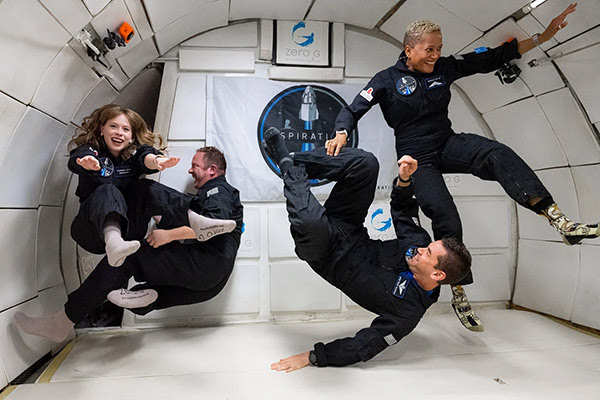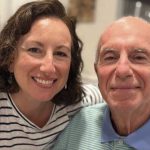
Earthlings in space. (Inspiration4 crew/John Kraus)
Data from astronauts on SpaceX’s Inspiration4 mission for civilians shows they got genetically younger.
You know we love anything that promotes space research. Living in space, growing meat on Mars, opening a ceramic studio on Mars. As treehuggers we love space research because ultimately it teaches us how to do better science and sustainability on earth.
So in the space sector news, there are some results in from the four civilian passengers of the Inspiration4 spaceflight about what happens to untrained-for-space bodies in orbit: during a short 3-day trip into Earth’s orbit.
Researchers found the space travelers experienced some of the same physiological changes during their roughly three-day trip into Earth’s orbit as astronauts on much longer missions.

“Civilian participants have different educational backgrounds and medical conditions compared to astronauts with career-long exposure to spaceflight. Understanding their physiological and psychological responses to spaceflight and their ability to conduct research is of utmost importance as we continue to send more private astronauts into space,” explained Dr Emmanuel Urquieta, chief medical officer at the Translational Research Institute for Space Health (TRISH), in a statement.
Read Related: Are steak growers making meat on Mars out to lunch?
The results are published in a new Nature paper explaining how even short spaceflights might affect human biology. Just a few days in orbit can cause immune-cell disruption, dehydration and cloudy thinking — but most of these conditions revert to normal soon after travelers return to Earth, according to the largest catalog of data detailing the impacts of space travel on the human body.
Every crewmember experienced lengthening of their telomeres during the flight. These are the protective caps on the ends of chromosomes, and they get shorter during our lives as our bodies’ cells undergo cycles of replication. Eventually, the telomeres become so short that they lose their power to protect.
Scientists have been experimenting with ways of boosting longevity by slowing telomere shortening.
All Inspiration4 crew showed evidence of telomere lengthening during their brief sojourn into space so it can be said that they got genetically “younger” during the mission. “It’s really a remarkable finding in several ways and helps us solidify our findings,” commented Susan Bailey, a professor at Colorado State University, in a press briefing.
“This is the beginning of precision medicine for spaceflight,” says geneticist Christopher Mason, who is a co-author on some of the papers.
The reports aim to chart how spaceflight affects space tourists, who have a wider variety of health histories and issues than selected and highly trained astronauts.
::Inspiration 4
Comments






